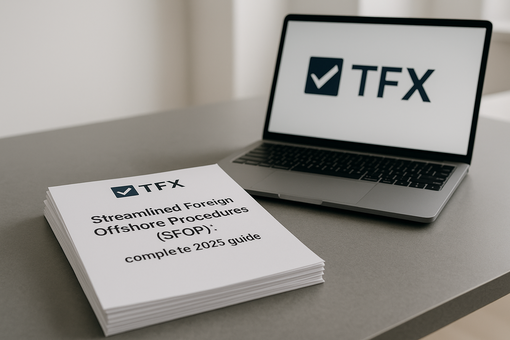The ultimate guide to IRS Form 709: Gift tax filing, exemptions, and instructions

Form 709, also known as the United States Gift and Generation-Skipping Transfer Tax Return, is a crucial document for those making significant gifts during their lifetime.
The form is used to report taxable gifts, allocate the Generation-Skipping Transfer (GST) exemption, and ensure compliance with US gift tax regulations. Importantly, Form 709 must be filed by the donor (the giver), not the recipient of the gift.
Understanding how and when to file Form 709 is essential for effective tax filing and estate tax planning. Whether you're gifting cash, property, or other assets, knowing the rules around gift tax returns will help protect your wealth and minimize tax liabilities for both you and your beneficiaries.
What is a gift for tax purposes?
For tax purposes, the IRS defines a gift as any transfer of money, property, or assets made without receiving something of equal value in return. This can include cash, real estate, or even the forgiveness of debt.
Transfers subject to gift tax are those that exceed certain exclusions and thresholds, requiring reporting on Form 709. A taxable gift refers to any gift that is subject to the gift tax after exclusions are applied.
There are also gifts of future interests, which differ from present interest gifts because the recipient cannot immediately enjoy the gift, such as a future right to use property.
Examples of gifts include:
- Cash gift.
- Real estate transfer.
- Direct payment for someone's medical expenses.
- Forgiveness of a loan or debt.
These gifts may be taxable depending on their value and the circumstances.
Who must file Form 709?
Knowing when a gift tax return is required and who has to file a gift tax return is essential to comply with IRS regulations.
Form 709 must be filed when a donor:
- Form 709 is generally required if you give more than the annual exclusion to any one recipient in the year (the annual exclusion is $19,000 for 2026). You also must file if you make any “future interest” gift (which doesn’t qualify for the annual exclusion), even if its value is $19,000 or less.
- Engages in gift splitting with their spouse (combining their gift exclusions). Spouses can’t file a joint Form 709. Gift-splitting is an election that generally requires a Form 709 to be filed to make the election, and in many cases both spouses must file their own Form 709 (with consent rules and limited exceptions described in the instructions).
- Makes gifts of future interests, such as irrevocable trust contributions.
- Makes a generation-skipping transfer (GST), which passes assets to a beneficiary two or more generations below the donor.
Exceptions include:
- Gifts to a US citizen spouse (no filing required). They are generally not reportable on Form 709 because of the unlimited marital deduction, but you may still need to file in specific cases (for example, certain terminable interest gifts or to make elections described in the Form 709 instructions).
- Direct payments for tuition or medical expenses (paid directly to the provider).
- Gifts below the annual exclusion amount. They usually don’t require Form 709, but you still must file if you elect gift-splitting with your spouse (to make the election) or if the gift is a future interest (which doesn’t qualify for the annual exclusion).
For nonresident aliens, the rules are different. Special rules apply when the donor is not a US citizen, so it’s essential to review how international gifting impacts Form 709 filing.
| When Form 709 is required | When not required |
|---|---|
| Gifts above the annual exclusion | Gifts to a US citizen spouse |
| Gift splitting with spouse | Payments for tuition/medical expenses |
| Gifts of future interests | Gifts below the exclusion amount |
| Generation-skipping transfers (GST) |
Gifts to a spouse who is not a US citizen do not qualify for the unlimited marital deduction. For 2026, you generally don’t need to file Form 709 for gifts of present interests to a noncitizen spouse unless total gifts to that spouse exceed $194,000 for the year (and future-interest gifts to a noncitizen spouse are reportable).
Key gift tax exclusions and exemptions
For 2026, the annual exclusion amount is set at $19,000 (per recipient).
This means you can gift up to this amount to any individual without having to file Form 709 or incur gift tax.
In addition to the annual exclusion, there is a lifetime exemption. which is currently $15 million per person for calendar year 2026, used to offset taxable gifts made during your lifetime. This exemption interacts with estate tax, meaning that any amount used during your lifetime to offset gift tax will reduce your estate tax exemption.
Another critical exemption is the GST exemption, which applies to gifts made to grandchildren or beneficiaries two generations removed. The Deceased Spousal Unused Exclusion (DSUE) allows the surviving spouse to use any unused portion of their deceased spouse's exemption.
For gifts to non-citizen spouses, there is a special lower exclusion threshold, which is significantly less than the standard gift exclusion.
This limit changes annually.
| Exclusion type | 2026 exclusion amount |
|---|---|
| Annual exclusion (per recipient) | $19,000 |
| Lifetime exemption (total) | $15,000,000 |
| GST exemption | $15,000,000 |
| Non-citizen spouse exclusion | $194,000 |
1. Transfers subject to gift and GST taxes
Certain gifts are subject to both gift tax and generation-skipping transfer (GST) taxes.
The GST tax applies when a donor makes a gift to a “skip persons” (generally someone two or more generations below you, like a grandchild, and certain transfers in trust). The tax is designed to prevent people from skipping generations to avoid estate taxes.
Transfers subject to both taxes include:
- Gifts to grandchildren
- Trusts where beneficiaries are two or more generations below the donor
- Large gifts made directly to younger family members
2. Gifts not subject to gift tax
Certain gifts are exempt from the gift tax, including:
- Charitable gifts;
- Political contributions;
- Direct payments for tuition or medical expenses (if paid directly to the institution or provider);
- Gifts made to spouses (if the spouse is a U.S. citizen).
These gifts are not considered taxable, and therefore Form 709 is not required.
In most cases, gift tax reporting is the donor’s responsibility, not the recipient’s, and gifts generally aren’t income to the recipient. One common exception: if a US person receives large gifts or bequests from a foreign person/foreign estate above certain thresholds, they may have an information-reporting obligation (for example, Form 3520 rules for certain foreign gifts).
Similarly, paying for medical expenses for a relative abroad can also be exempt, provided the payment is made directly to the medical provider. This exemption helps US taxpayers manage their gifts efficiently across borders.
When and how to file Form 709
When is a gift tax return due?
Form 709 due date is on on April 15 of the year following the calendar year in which the gift was made. To extend the filing deadline, you can:
- file Form 4868 to extend your individual return—this also extends the time to file Form 709 for that year; or
- file Form 8892 if you’re not extending your individual return. An extension to file does not extend the time to pay any gift/GST tax due.
However, keep in mind that extensions only apply to the filing deadline – payment of any gift tax owed is still due by the original due date.
How to file a gift tax return:
You can file Form 709 via mail or e-file. It’s important to note that Form 709 does not need to be filed with your 1040 tax return, but it must be submitted separately to the IRS.
Mail Form 709 to the IRS address listed in the instructions (generally the IRS Service Center in Kansas City, MO). If you use a private delivery service, use the PDS address provided in the instructions.
Step-by-step instructions for completing Form 709
Filing Form 709 involves several steps.
Here’s a general overview of the process:
- Gather information: Collect details of the donor (you) and donee (recipient), including their names, addresses, and tax identification numbers. Prepare descriptions and values of the gifts, as well as dates.
- Complete General Information (Part I): This section asks for basic information, including the donor’s identity and the total amount of gifts made.
- Elect gift splitting (Part III): If you’re gift splitting with your spouse, elect this option here to combine both of your gift exclusions.
-
List gifts in Schedule A (Parts 13):
Part 1: Report gifts subject only to gift tax.
Part 2: Report gifts subject to both gift and generation-skipping transfer (GST) taxes.
Part 3: Report gifts that qualify as indirect skips, i.e., gifts made to trusts where the beneficiary is multiple generations removed. -
Complete Schedules B, C, D:
Schedule B: List prior gifts made.
Schedule C: Report any Deceased Spousal Unused Exclusion (DSUE).
Schedule D: Complete GST tax computation for gifts subject to GST tax. - Reconcile taxable gifts (Schedule A, Part 4): This section ensures that all taxable gifts are correctly accounted for.
- Calculate tax due: Use the provided tax tables to calculate the gift tax owed.
- Sign and file: Make sure to sign the form and file it with the IRS.
For a detailed step-by-step guide, refer to the official Form 709 instructions provided by the IRS. Alternatively, you can download Form 709 directly here below for your convenience.
Form 709 preview
If you need assistance with any part of the process or have specific questions, don't hesitate to contact our expert team for personalized support in completing and filing your gift tax return.

Common mistakes and how to avoid them
Filing Form 709 can be complex, and mistakes can lead to penalties or missed tax-saving opportunities.
Here are some common errors to avoid:
- Missing reportable gifts – Ensure you report all taxable gifts, especially gifts of future interests (e.g., gifts that cannot be immediately enjoyed by the recipient, such as a life estate or future use of property). These gifts often get overlooked but must be reported for accurate tax calculations.
- Incorrect exclusion calculations – Double-check the annual exclusion amount ($19,000 for 2026) and the lifetime exemption. Make sure you're applying the correct amount for each recipient and that you account for any gifts made in previous years.
- Not reporting split gifts correctly – If you're gift splitting with your spouse, ensure you follow the proper steps to allocate the exclusions between both of you. This can often lead to underreporting if not documented clearly.
- Failing to allocate GST exemption – When making generation-skipping transfers (GSTs), it’s crucial to allocate your GST exemption correctly. Missing this step can affect multi-generational wealth transfers, leading to unnecessary tax liabilities.
- Missing the deadline – Form 709 is due by April 15th of the year following the gift. If you miss the deadline, you could face penalties or interest on any tax owed. Always file on time or request an extension to avoid complications.
Advanced strategies and pro insights
When it comes to gift tax planning, advanced strategies can make a significant difference in reducing your overall tax liability.
Here are a few ways to leverage Form 709 effectively:
- Using annual exclusions and the lifetime exemption for estate planning: Strategically gifting assets each year can reduce the size of your taxable estate, minimizing future estate taxes.
- Leveraging GST exemption for multi-generational wealth transfer: By making generation-skipping transfers (GST), you can pass wealth to grandchildren or other heirs while avoiding estate taxes across multiple generations.
- Understanding the Deceased Spousal Unused Exclusion (DSUE): If your spouse has passed, you may be able to use their unused gift tax exemption to increase the amount you can gift tax-free.
- Tax implications for foreign donors and recipients: If you're living abroad or making gifts to a foreign recipient, the tax rules can become more complex. Consult a tax professional to navigate international gifting properly.
For complex situations, always consult with a CPA to ensure you’re making the most of your gifting strategy.
Get professional help with your gift tax filing
At Taxes for Expats, we offer expert guidance and personalized support for all your gift tax filing needs.
Whether you’re filing Form 709 for the first time or managing a more complex estate, our experienced professionals can help you navigate the intricacies of US gift tax laws.
We provide long-term assistance, so you can focus on what matters most – your family and future. Contact us today for a consultation and ensure your gift tax filings are accurate and timely.
Sign up and get started today

FAQ
Form 709 can be filed by mail, and it can also be filed electronically through the IRS Modernized e-File (MeF) system (typically via approved tax software or a tax professional). If you e-file, you may also be able to authorize an electronic funds withdrawal for any balance due.
Yes, gifts of cryptocurrency or stocks are considered taxable gifts and must be reported on Form 709 if they exceed the annual exclusion amount.
Yes, gifts to non-citizen spouses have a lower exclusion threshold than gifts to US citizen spouses and must be reported on Form 709.
To correct an error, file an amended Form 709 (mark it as amended per the form/instructions) and mail it to the IRS address for amended gift tax returns.
If you receive a gift from abroad, it may be subject to different tax rules. Form 3520 may need to be filed if the value exceeds $100,000.
No, Form 709 is filed for the total value of taxable gifts made during the year, not for each individual gift.
No, Form 709 is only required for gifts that exceed the annual exclusion amount. Gifts below the threshold do not require reporting.
Form 709 is used to report taxable gifts and generation-skipping transfers, while Form 3520 is required for reporting gifts from foreign persons or estates.

Stay IRS-compliant with your business abroad – we’re ready to help


